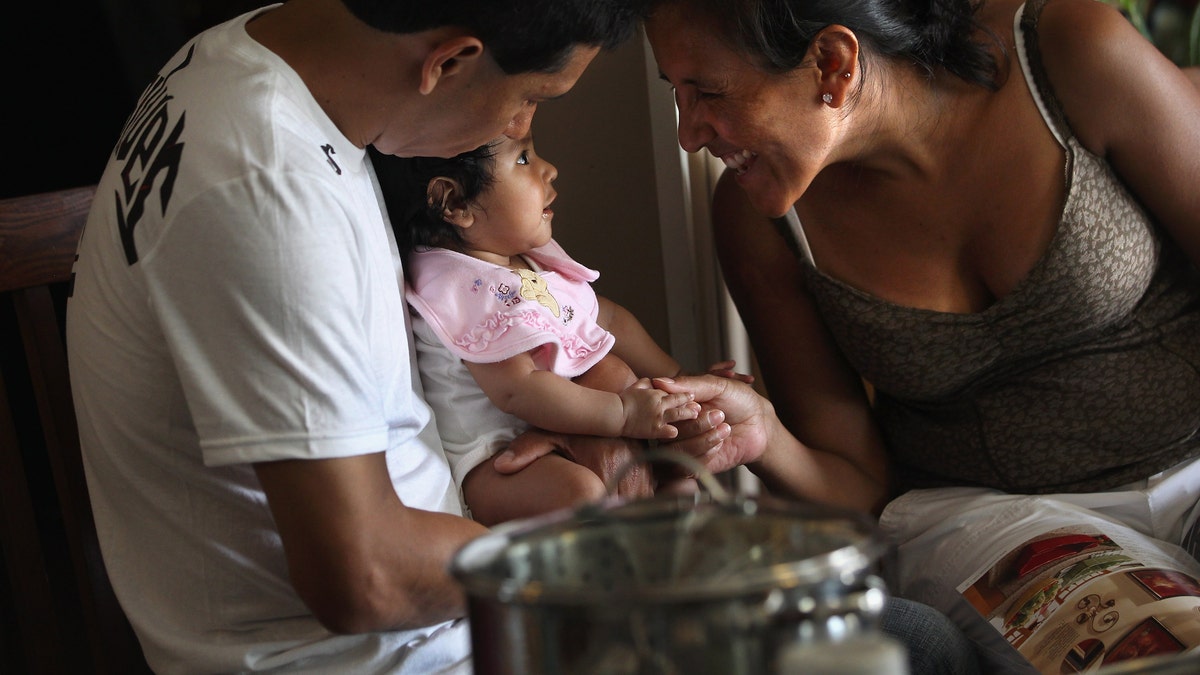
DENVER, CO - JULY 10: Undocumented Mexican immigrant Jeanette Vizguerra sits with her husband Salvador and daughter Zuri, 5 months, on July 10, 2011 in Denver, Colorado. Vizguerra, a mother of four children, three of whom were born in the U.S. as American citizens, is facing a deportation hearing July 13 at Denver's Federal Courthouse. If Vizguerra is deported back to Mexico, she says her husband and children will stay on in the United States. Just one of millions of undocumented immigrants living in the U.S., Vizguerra first came to Colorado from Mexico City with her husband and first child 14 years before. Now an activist for the immigration advocate group Rights For All People, she also owns a janitorial service and says she has always paid state and federal taxes on her income. Some two years ago she was stopped by a traffic policemen for driving with expired tags and taken to jail when she could not prove her legal immigration status. Out on bail during court proceedings, she now faces the real possibility that she will be deported to Mexico and separated from her family in the United States. (Photo by John Moore/Getty Images) (2011 Getty Images)
An international human rights organization is stepping into the revived U.S. immigration reform debate, arguing emphasis should be placed less on enforcement and more on keeping families united.
In the 19-page report from Human Rights Watch, released Friday, the human rights group described various examples of immigrants suffering from an inhumane and dysfunctional immigration system.
The briefing included stories of immigrant families who had been torn apart because of the nation's “outdated and inefficient immigration system,” and urged lawmakers to update the family-based component by “granting immigration judges the power to consider family unity as a major factor in all deportation decisions.”
Consequently, the report concluded: “The injustices of the U.S. immigration system have had devastating consequences for millions of people – not just unauthorized immigrants, but their families, their employers, and their communities. By creating a fairer system, the United States can better regulate migration and uphold the rule of law.”
Human Rights Watch, a global leader on the issue of human rights, released its report at a time when national leaders have kicked the topic of comprehensive immigration reform into high gear. On Monday, eight senators – four Democrats and four Republicans – released a five-page proposal for overhauling the immigration system. On Tuesday, Obama unveiled his own plan, a similar approach to the senators albeit with a few differences.
Both proposals essentially tighten enforcement, addressing such things as cracking down on employers who hire undocumented workers and bolstering security along the border. And they call for providing certain undocumented immigrants a path to legalization if they meet a broad set of criteria, including learning English, paying fines, documenting a history of paying taxes and passing a criminal background check.
A major difference, however, is how quickly undocumented immigrants can begin working toward legalization. The senators’ proposal calls for reaching a level of success in improving border security and enforcement before the process for a pathway to legalization can begin. The president said that both can be carried out at the same time, and said he objects to making the legalization part contingent on the progress on enforcement.
Human Rights Watch said four principles should guide a reform of the immigration system.
Those are respecting and protecting families, protecting immigrants from workplace violations and crime, including a legalization process that "respects families, protects victims from abuses andcrimes, and acknowledges the contributions of long-term residents," and focusing enforcement efforts on genuine threats and ensure due process rights are protected for all people.




